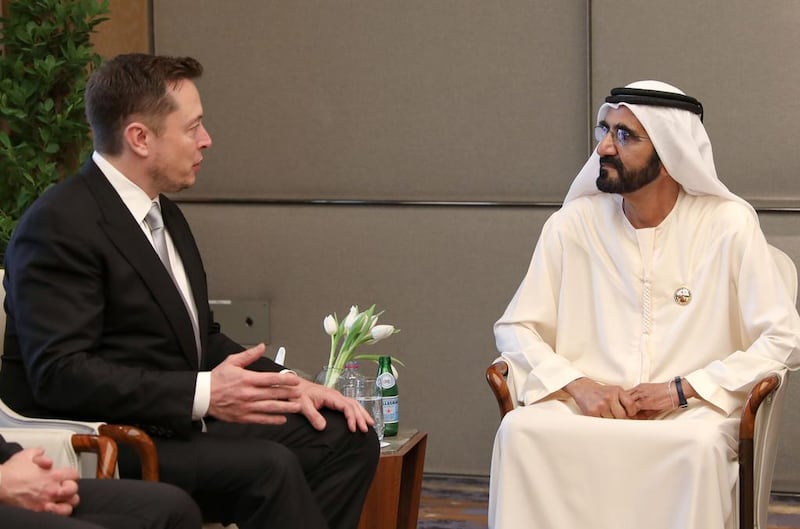ABU DHABI // Elon Musk simply wants to change the world and humanity.
Through the array of companies he has founded and heads the business magnate aims to revolutionise transportation on the ground and in space, reduce global warming by producing and consuming energy in a sustainable manner, and avoid human extinction by colonising Mars.
It is little wonder that Robert Downey Jr based the Iron Man character, Tony Stark, on the billionaire engineer, after the actor was blown away during a personal tour of Musk's SpaceX headquarters in California.
The celebrity entrepreneur’s recent astronomical rise has been fueled in particular by two of his enterprises, Tesla and Space X, but his ascension in the high-tech industry began long before.
Born to a South African father and Canadian mother in Pretoria in 1971, Mr Musk showed an early gift for computers and entrepreneurship, which he demonstrated by creating and selling a video game to a computer magazine for US$500 when he was 12.
After obtaining Canadian citizenship through his mother, Mr Musk moved to Canada at 18, where he started his undergraduate degree at Queen’s University in Kingston, Ontario.
He then transferred to the University of Pennsylvania where he completed his degree in physics and economy at the age of 24.
In 1995 Musk made the move to the heart of silicon valley to pursue a doctorate degree at Stanford University in California, the state which would become his and his enterprise’s home.
However, Musk’s time as a Stanford student last a few days opting to ride the Internet boom of the nineties by launching his first company, Zip2, with his brother with US$28,000 of their father’s money.
Four years later they sold the web-based software company, which had been providing content for the New York Times and Chicago Tribune websites, for US$307m in cash and $34m in stock options, of which Mr Musk received US$22m.
This was followed by greater success after the multi-millionaire’s next projects led to the creation of the money transfer service PayPal, which was acquired by eBay in 2002 for US$1.5 billion in stock, of which Musk received US$165 million.
He became a US citizen in the same year.
Musk founded his third company, Space X, in 2002, with the aim of developing commercial space travel.
Six years later the company was awarded a NASA contract to transport cargo to the International Space Station and in 2012 the company made history when it’s Falcon 9 rocket delivered 1,000 pounds (453 kilograms) of supplies to the station’s astronauts.
This marked first time a private company had sent a spacecraft to the International Space Station.
The engineer also co-founded Tesla in 2003, which initially sold electric sports cars, but now offers more affordable sedan and minivan electric cars.
Another innovative venture the entrepreneur is attempting is the Hyperloop concept of high-speed transportation.
With feasibility studies to connect Abu Dhabi with Dubai and Al Ain under way the UAE could become a first-adopter of the technology.
tsubaihi@thenational.ae






